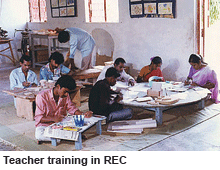The origins of Activity Based Learning (ABL) pedagogy can be traced to David Horsburgh, a British Royal Air Force officer posted in India during World War II. Stationed in Chittagong, East Bengal (now Bangladesh), Horsburgh was enchanted by the region’s idyllic village schools set amidst paddy fields, and returned to India after the war to teach in a rural school. In 1950, he signed up with the alternative style Rishi Valley School, Chittoor and worked with the Blue Mountain School, Ooty, and the British Council in Madras and Bangalore. Finally in 1972 together with his wife Doreen, he founded the Neel Bagh School on a seven-acre site in Kolar district (100 km from Bangalore)
Neel Bagh admitted its first batch of 30 students aged three-20 years from neighbouring villages with Horsburgh designing and developing a unique curriculum, which included music, carpentry, sewing, masonry, gardening apart from English, mathematics, science, Sanskrit, Telugu and other languages.
Horsburgh also developed a rigorous teacher training programme for the new ABL pedagogy devised by him. Since then several teachers trained in Neel Bagh have founded their own schools including M.C. Malathi of Vikasana in Bangalore; Amukta Mahapatra, an independent consultant in Chennai, and Usha and Narasimhan of Sumavanam, Madanapalle, Andhra Pradesh.
 After Horsburgh’s death in 1984, Neel Bagh was acquired by philosopher Jiddu Krishnamurthy (1895-1986), founder of Rishi Valley School (estb.1926). However, without Horsburgh’s energy and leadership, Neel Bagh couldn’t be sustained and downed shutters in 1987. But Radhika Herzberger, director of the Rishi Valley School, continued to nurture the dream of activity-based education for children in villages adjoining Rishi Valley School. And the Rishi Valley Rural Education Centre (REC) with the support of Usha and Narasimhan of Sumavanam began to develop learning materials for primary school children. But the activity-centred learning movement was accelerated only after Padma-nabha Rao and his wife Rama Rao — postgraduates in English and education with strong roots in folk theatre and poetry — signed up with REC in 1987. After intensive research and consult-ation with artists, writers, teachers and theatre performers, the Raos developed the ABL pedagogy comprising learning ladders which breaks up the learning process into small units.
After Horsburgh’s death in 1984, Neel Bagh was acquired by philosopher Jiddu Krishnamurthy (1895-1986), founder of Rishi Valley School (estb.1926). However, without Horsburgh’s energy and leadership, Neel Bagh couldn’t be sustained and downed shutters in 1987. But Radhika Herzberger, director of the Rishi Valley School, continued to nurture the dream of activity-based education for children in villages adjoining Rishi Valley School. And the Rishi Valley Rural Education Centre (REC) with the support of Usha and Narasimhan of Sumavanam began to develop learning materials for primary school children. But the activity-centred learning movement was accelerated only after Padma-nabha Rao and his wife Rama Rao — postgraduates in English and education with strong roots in folk theatre and poetry — signed up with REC in 1987. After intensive research and consult-ation with artists, writers, teachers and theatre performers, the Raos developed the ABL pedagogy comprising learning ladders which breaks up the learning process into small units.
As word spread about REC’s innovative ABL programme, school teachers from southern states including Tamil Nadu began visiting the centre for training. Impressed with ABL, Tamil Nadu adapted REC’s learning materials for implementation in its schools and in 2003, M.P. Vijayakumar, then commissioner of Chennai Municipal Corporation, formally launched ABL on an experimental basis in 13 corporation schools, later expanded to all 264 corporation schools in Chennai.